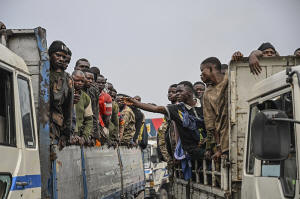Rwanda-backed rebels in eastern Congo say they plan to take their fight
to the capital
 Send a link to a friend
Send a link to a friend
 [January 31, 2025]
By CHINEDU ASADU and JUSTIN KABUMBA [January 31, 2025]
By CHINEDU ASADU and JUSTIN KABUMBA
GOMA, Congo (AP) — Rwanda-backed rebels who captured eastern Congo's
largest city said Thursday they want to take their fight to the far-off
capital, Kinshasa, while Congo’s president called for a massive military
mobilization to resist the rebellion and his defense minister rejected
calls for talks.
In a video message, Congo's Defense Minister Guy Kabombo Muadiamvita
said he has directed plans for any dialogue with the rebels to “be
completely burned immediately.”
"We will stay here in Congo and fight. If we do not stay alive here,
let’s stay dead here,” said Muadiamvita, a close ally of Congo's
president.
At a briefing where they sought to assert their control over the eastern
city of Goma and surrounding territory in the neighboring South Kivu
province, the M23 rebels said they would be open to dialogue with the
government, also proposed by the east African regional bloc of which
Rwanda is a member.
Their motive, however, is to gain political power, Corneille Nangaa, one
of the political leaders of M23, said during the briefing. "We want to
go to Kinshasa, take power and lead the country,” Nangaa said. He did
not indicate how the rebels planned to advance on the capital, more than
1,500 kilometers (nearly 1,000 miles) away.
Rwanda's leader, Paul Kagame said he spoke with Angola's President Joao
Lourenco — a mediator in the conflict who also met with Congo's leader a
day earlier — and both leaders committed to working with other African
countries to resolve the hostilities.

President Donald Trump described the conflict as a “very serious
problem” when asked about it Thursday but declined to comment further,
and a U.N. spokesman said the agency is “disturbed” by reports that
neighboring Rwandan forces have crossed the border in the direction
where the rebels are said to be advancing.
The M23 rebels are backed by some 4,000 troops from neighboring Rwanda,
according to U.N. experts, far more than in 2012 when they first
captured Goma. They are one of more than 100 armed groups vying for
control in Congo’s mineral-rich east, which holds vast deposits
estimated to be worth $24 trillion that are critical to much of the
world’s technology.
Congolese President Félix Tshisekedi, meanwhile, called on young people
to enlist massively in the military, as a crucial meeting of neighbors
asked the Congolese government to talk with the rebels. Rwanda's leader
also threatened to “deal” with any confrontation with South Africa,
which has complained that fighting in eastern Congo has left South
African peacekeepers dead.
In his first public remarks since the M23 rebels advanced into Goma on
Monday, Tshisekedi vowed “a vigorous and coordinated response” from his
forces to push back the rebels while reaffirming his commitment to a
peaceful resolution.
On Thursday, he met with French Foreign Minister Jean-Noël Barrot in
Kinshasa, the Congolese presidency said on X, noting that France has
provided significant support to Congo in recent U.N. meetings on the
issue. “(Congo) expects a little more action in the face of this
crisis,” it added.
Dead bodies, looting in Goma
Goma remained largely without electricity and water on Thursday, as the
bodies of several alleged government soldiers lay in the streets,
horrifying residents, including children.
M23 rebels escorted some 2,000 government soldiers and police officers —
who they said surrendered — to an undisclosed location, some of them
singing anti-Tshisekedi songs.
The U.N. Humanitarian Coordinator in Congo said basic services are
largely paralyzed in Goma, a humanitarian hub critical for more than 6
million people displaced by the conflict. “After several days of intense
clashes, the city is now (faced) with massive humanitarian needs and
severely impacted response capacities,” said Bruno Lemarquis, the
humanitarian coordinator.
Footage from Goma showed residents carrying food items and goods looted
from stores and warehouses in the city. “This is something that is going
to exacerbate a dangerous cycle of violence as desperate times call for
desperate measures,” the U.N. World Food Program emergency coordinator
in eastern Congo, Cynthia Jones, said Thursday.
[to top of second column]
|

M23 rebels escort government soldiers and police who surrendered to
an undisclosed location in Goma, Democratic republic of the Congo,
Thursday, Jan. 30, 2025. (AP Photo/Moses Sawasawa)

South Kivu gripped by fear
After capturing much of Goma, the rebels were advancing toward South
Kivu’s provincial capital, Bukavu, causing fear and panic among
residents, witnesses said Thursday.
Néné Bintou, a civil society leader, said gunshots and explosions
were heard in Mukwinja, a captured town 86 miles (135 kilometers)
from Bukavu.
The Congolese military has been weakened after hundreds of foreign
military contractors withdrew and handed over their arms to the
rebels. Residents of Goma described seeing soldiers changing into
civilian clothing and dropping their guns as they crossed over the
border to Rwanda or took shelter in foreign peacekeeping bases.
“The (Congolese) military bases in Bukavu have been emptied to
reinforce those in Nyabibwe, Bushushu, and Nyamukubi" along the way
to the capital, one youth leader said, speaking on the condition of
anonymity because he was worried about his safety.
Neighbors urge talks with M23 as tensions grow
A summit of the regional East African bloc called for an immediate
and unconditional ceasefire in eastern Congo and “strongly urged”
Tshisekedi’s government to hold talks with the rebels. Tshisekedi
was conspicuously absent from the virtual summit attended by Rwanda,
also a member.
While African countries as well as the U.N. and U.S. have called for
an immediate ceasefire, the risk of a regional war has increased,
analysts say, exacerbated by the rebels' advance into South Kivu and
diatribes between Rwandan and South African officials. Congo is a
member of the southern Africa regional bloc and also that of east
Africa, whose peacekeeping force it expelled last year after deeming
it ineffective.
South African President Cyril Ramaphosa blamed the “Rwanda Defense
Force militia” for the fighting that has resulted in the deaths of
13 South African peacekeepers in eastern Congo. He also said his
government will ensure the peacekeepers are “sufficiently supported
during this critical mission.”

His comment drew an angry response from Kagame, who called the South
African peacekeepers a “belligerent force” working alongside armed
groups that target Rwanda. “If South Africa prefers confrontation,
Rwanda will deal with the matter in that context any day,” the
Rwandan leader said on the social media platform X.
Who are the M23 and what do they want?
The chaotic situation with the M23 has its roots in ethnic conflict,
stretching back to the 1994 genocide in Rwanda, when 800,000 Tutsis
and others were killed by Hutus and former militias. M23 says it is
defending ethnic Tutsis in Congo. Rwanda has claimed the Tutsis are
being persecuted by Hutus and others involved in the genocide. Many
Hutus fled into Congo after 1994.
Unlike in 2012 when the rebels seized Congo for days, observers say
their withdrawal could be more difficult now. The rebels have been
emboldened by Rwanda, which feels Congo is ignoring its interests in
the region and failed to meet demands of previous peace agreements,
according to Murithi Mutiga, program director for Africa at the
Crisis Group, a think tank.
“Ultimately, this is a failure of African mediation (because) the
warning signs were always there. Kigali was adopting very bellicose
rhetoric and the Congolese government was also adopting very, very
aggressive rhetoric,” Mutiga said.
___
Asadu reported from Abuja, Nigeria. AP journalists Ruth Alonga in
Goma, Jean-Yves Kamale and Christina Malkia in Kinshasa, Congo, Mark
Banchereau in Paris and Edith M. Lederer in New York contributed to
this report.
All contents © copyright 2025 Associated Press. All rights reserved |